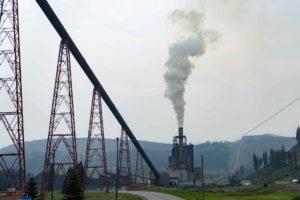 A large scale of the coal mining industry developed over the industrial revolution as it became a primary source during the 1950’s. However, whilst the industry grew economically, the conditions for the mining personal deteriorated as groups of up to 900 would delve into the coal pits, meters below the earth’s atmosphere. This is where the miners would endure claustrophobic, sweltering conditions, as well as being exposed to breathing in mass volumes of polluted air. The conditions for these miners were unsustainable, in addition to the safety of the miners being unpredictable, but yet despite these awful conditions the idea of coal as an affordable energy source only influenced more countries such as China, India and America to invest within the concept. As the leaders in power grew their countries economic status, the planet was being blanketed in a vast amount of Co2 emissions.
A large scale of the coal mining industry developed over the industrial revolution as it became a primary source during the 1950’s. However, whilst the industry grew economically, the conditions for the mining personal deteriorated as groups of up to 900 would delve into the coal pits, meters below the earth’s atmosphere. This is where the miners would endure claustrophobic, sweltering conditions, as well as being exposed to breathing in mass volumes of polluted air. The conditions for these miners were unsustainable, in addition to the safety of the miners being unpredictable, but yet despite these awful conditions the idea of coal as an affordable energy source only influenced more countries such as China, India and America to invest within the concept. As the leaders in power grew their countries economic status, the planet was being blanketed in a vast amount of Co2 emissions.
However, once Thatcher took reign as P.M in the U.K during 1979 her premeditated ambition to bust the trade unitions came into immediate effect during 1984 as the political riot between Scargill and Thatcher began. Through which this only triggered a national domino effect of a miner’s strike. Throughout the year of 1984 thousands of miners took it upon their own liberty to fight the war against Thatcher phasing out their job sector, as over 70 coal pits that the government owned were ruthlessly shut down in the space of a year. Environmentally speaking, Thatcher was ahead of the curve as she eventually won the battle to phase out the coal mining industry in the U.K during 1985, but while our production stopped, others grew.
India, China and America only increased their coal production as pollution inclined, with America sourcing 60% of its energy needs via the coal industry and China manufacturing a mass amount of the substance in order to sell to other countries, such as the U.K. Despite the U. K’s law enforcement’s phasing out the production of coal, its usage for the material continued to thrive as the U.K has become one of the most fossil fuel polluting countries in the world via materials external to coal. But, unless the other larger countries such as America, India and China don’t participate in the pledge to phase out coal, then the earth’s foreseeable future is unprecedented. Since the coal industry began, Co2 emissions have risen by a staggering 46% causing serious health deterioration, unpredictable weather fluctuations, rising sea levels, as well as causing a constant disturbance to animals and natural habitats.
 Unless these countries agree to cooperate with the immediate action plan of phasing out the coal industry, and stop playing linguistic gymnastics with government officials, such as India’s representative Alok Sharma, claiming to “phase down” the coal industry rather than the other 40 countries agreeing to phase it out, then our planet will be hanging on by a thread in a matter of years.
Unless these countries agree to cooperate with the immediate action plan of phasing out the coal industry, and stop playing linguistic gymnastics with government officials, such as India’s representative Alok Sharma, claiming to “phase down” the coal industry rather than the other 40 countries agreeing to phase it out, then our planet will be hanging on by a thread in a matter of years.
Throughout the COP26 conference, various American representatives claimed to have suffered a “dark period” of four years during the presidency of Trump, as well as state that their progression within the environmental sector has been unwillingly stalled due to his reign. However, if this were true why did America refuse to sign the pledge to phase out coal? The concept of the American dream has been surrounded by the coal industry for decades, however this has started to change. None the less, this will only be enforced permanently if the younger is presented with a sustainable alternative that will only grow and expand the coal mining industry. Many small-town communities state that by shutting down a vast majority of the mines “is not just about the consequences of job losses, but it erases a piece of history and culture”. The younger generation are now eager for an alternative job sector that will environmentally last and help evolve sustainably with the times, as well as restore a different piece of history and culture.
Politicians, as well as leaders in power have an obligation to start leading by example of how we must live our lives in order to save our planet, rather than continually tripping up on their hypocrisy. Not only did Boris Johnson travel back via plane from Glasgow to London for an evening meal during the COP26 conference, but Bill Gates found it favourable to donate £233 million to the ‘green industrial revolution’. Yet despite himself being responsible for an enormous amount of the technological pollutants through his entrepreneurship in Microsoft. Society is eager to get involved with making the transition to a greener planet and are continuously amplified with hope to do so, but then shot back down with false promises made by government. Despite world leaders promising that the COP26 conferences would be the “most inclusive ever”, just four tickets were allocated to cover around 30 negotiating sessions. So, what will it take for government to listen?
Renewable sustainable technology is the future. With the transition of each new generation entering the world, our knowledge and intellect only expands, as throughout each decade we learn more about our surrounding universe; what it needs to be maintained, but most importantly what it can’t handle. With the investment of various renewable energy sources such as, tidal waves, solar panels, wind turbines, and hydroelectric, then the phase out of coal will not cause any immediate employment back lash as alternative job options will be made accessible; creating job security.
The value of education has started to increase since the depletion of the coal industry by helping those entering the undivulged world of employment to find a variation of job routes eligible for them. Therefore, without the crucial cooperation of government how can the enforcement of the changes such as the phase out of the coal industry be put into action? The economy should come into consideration but, it must fit into unison with the worlds transition to a greener planet before it is too late.






